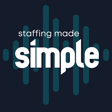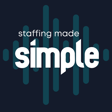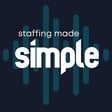
Selling Smarter: Winning the Staffing Sales Game
Selling staffing today is a whole new ballgame. Decision-makers are tougher to reach, buyers are doing their homework long before you ever make contact, and differentiation has never been harder. The old playbook – impersonal cold calls, generic pitches, and canned follow-ups – just doesn’t cut it anymore.
In this episode of Staffing Made Simple, hosts Rob Geist and Casey Wagonfield dig into the realities of selling in 2025: what’s changed, what’s working, and how the best staffing pros are rethinking their approach to prospecting, positioning, and closing.
To help unpack it all, they’re joined by Tom Erb, President of Tallann Resources, national speaker, and author of Winning the Staffing Sales Game. With more than 25 years of industry experience, Tom brings proven strategies for standing out in a crowded market – sharing what top producers do to build trust faster, add real value in early conversations, and win clients who stick.


